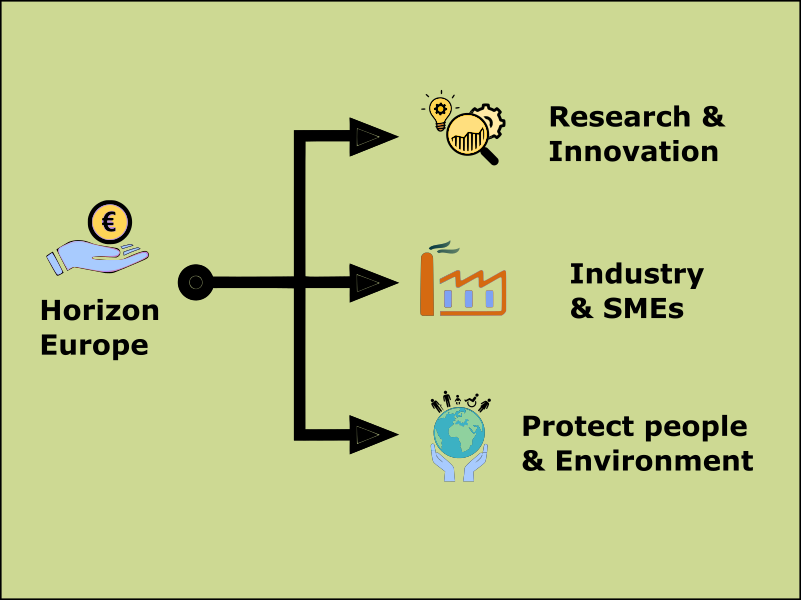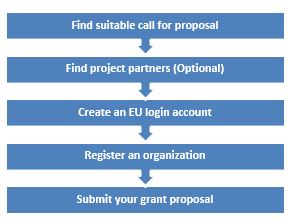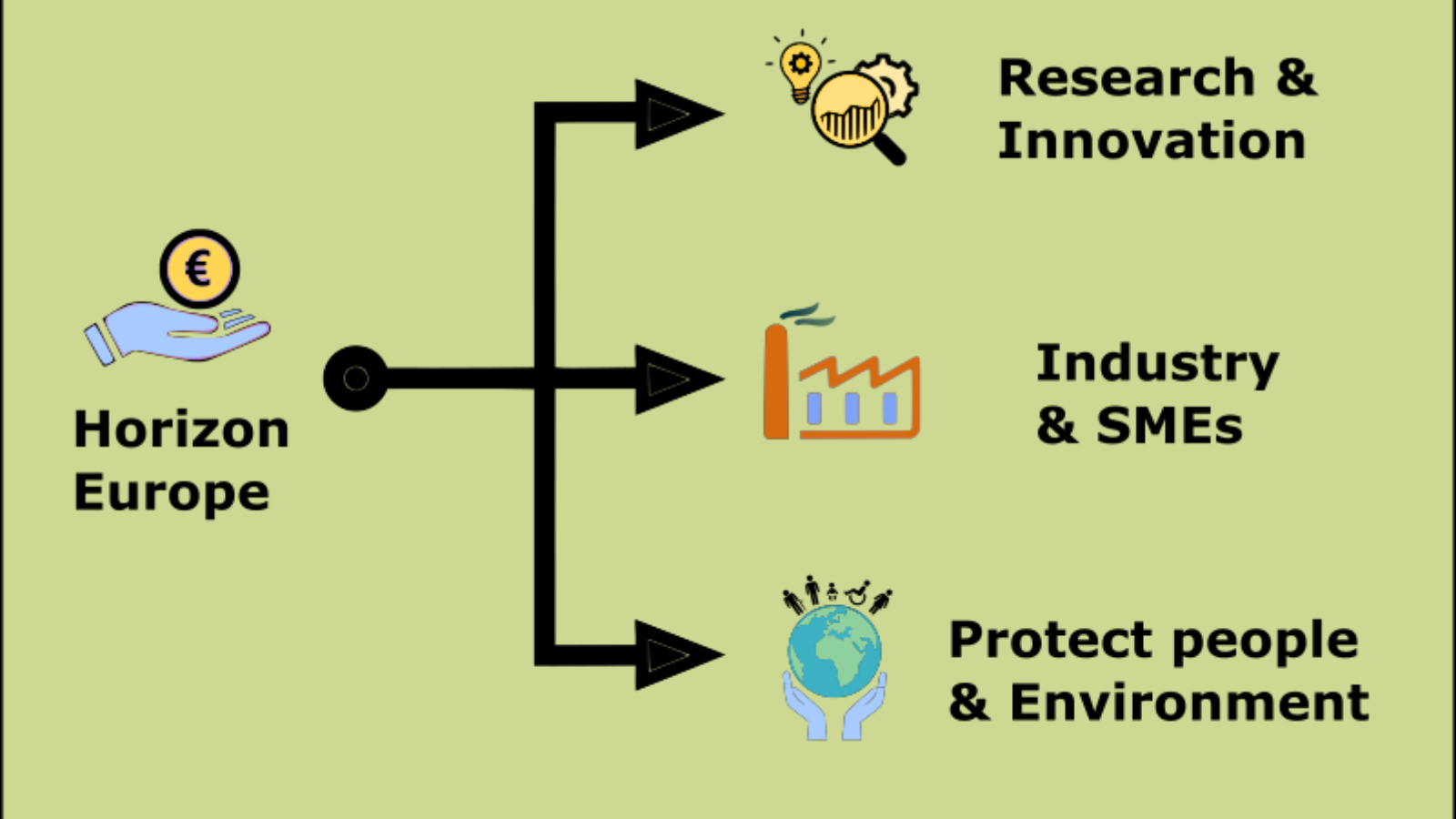
So you want to know how research institutes, universities and SMEs get public funding in Europe? EU Public Funding for Companies is indeed a generous offer available to every one. But what are the Eligibility and evaluation Criteria.
Anantha Sai Ram Pasupulati and Dr. Javad Zarbakhsh, Cademix Institute of Technology
EU Public Funding for Companies (Horizon Europe)
Horizon Europe (HE) is the main funding program in Europe with the budget of 95.5 billion euros. Firstly, this is the funding program that supports the research and innovation in Europe and its associated countries. Further, this is a budget starting from 2021 for the duration of 7 years. It specifically combats climate change, aids in the achievement of the UN’s Sustainable Development Goals and increases the EU’s competitiveness and growth. Similarly, the program promotes collaboration and increases the impact of research and innovation in the development, support, and implementation of EU policies while addressing global challenges. Moreover, it promotes the creation and dissemination of superior knowledge and technologies. Thus, within a stronger European Research Area, it creates jobs, fully engages the EU’s talent pool, boosts industrial competitiveness, and maximizes investment impact.
Horizon Europe now includes new elements
According to the European Innovation Council, funding is available for breakthrough and disruptive innovations. Specifically, they have the potential to scale up but are too risky for private investors. In fact, this represents 70% of the budget allotted to SMEs.
Missions: Sets of actions designed to achieve bold, inspiring, and measurable goals within a specific timeframe. Horizon Europe has five primary mission areas.
Open science policy: Open access to publications is mandatory, and open science principles applies throughout the program Factsheet: Open science in Horizon Europe.
New approach to partnerships: Partnerships with industry that are more objective-driven and ambitious in support of EU policy objectives.
Eligibility Criteria
All European citizens are eligible for the public funding in Eligibility Criteria. Based on type of business or project, there are different types of funding programs available. This includes young people, Researchers, Farmers, Companies, Public bodies: cities and regions, NGOs, and Others.
| Young people | This funding program is available for young people (age 13-31), youth organizations, and other stakeholders working with young people. |
| Researchers | This funding is available for research projects in numerous fields, carried out by organizations or individuals. |
| Farmers | You must comply with certain requirements in the areas of public, animal and plant health, environment, and animal welfare. |
| Companies | EU programs are specifically supporting Micro, small and medium-sized enterprises (SMEs). |
| Public bodies | Whether local, regional, or national – can benefit from many EU funding opportunities, including investments to support the development of institutional capacity and efficiency |
| NGOs | Non-profit organizations are eligible for EU funding where their areas of activity relate to EU policies. Others like Accession to the European Union and Economic crisis |
Application Process
All the programs funded by the EU budget fall under one of three types of implementation modes depending on the nature of the funding concerned:
- Direct management
- shared management
- indirect management

The evaluators use the following selection and award criteria to score proposals: 1) excellence, 2) impact, 3) quality, and implementation efficiency. They apply the Standard Evaluation Criteria to go into great detail about each type of actions. Experts rate each award criterion on a scale of 0 to 5. (Half-point scores are possible). The decision committee consider the proposal with scores higher than a certain threshold. This procedure is unique for each call and funding framework. Thresholds may vary according to the work program.
Self-Evaluation for SME:
Some Points to be considered in Self-evaluation for Impact:
- Convince explanation for potential creation of new market with specific substantial demand for innovation
- Describe the targeted users of the innovation, how this help for their needs, and why the customer wants to use or buy the product. If product is available, then explain how it differs
- Make a realistic and relevant analysis of outside your company. For example, market conditions and growth rate, market creation and disruption and within company like Key stakeholders
- A realistic and relevant description for the probability of scale up innovation potential to company. Indeed, it must point out with business plan with timeline, track record with financial data.
- Alignment of the proposal with the applicant SME’s overall strategy, as well as the commitment of the team behind it. In terms of both commercialization and assessing competitors and competitive offerings, the European/global dimension of innovation is important
- Evidence of or realistic measures to ensure ‘freedom to operate’ compelling knowledge-protection strategy. It specifically includes, current IPR filing status, IPR ownership, and licensing issues Addressed regulatory and/or standard requirements
Consider these points in Self-evaluation for excellence:
- EU seeks breakthrough innovations or game-changing ideas. Because of its high level of novelty, it has a high chance of success or failure
- Detailed description on realistic current development, and therefore steps planned to take it into innovation market
- An innovation solution that goes beyond state of art with comparison of existing or comparison with existing or competing solutions. For instance, the solutions may include costs, ease of use and issues relevant to climate change or environment, the gender dimension, other benefits to society
- Understanding the technical and commercial risks and opportunities associated with the successful market introduction of the innovation
Some Points to be considered in Self-evaluation for quality and efficiency of implementation:
- We should consider evidences that the applicant company cannot leverage sufficient market investments.
- The team’s technical/business experience, including management capacity to lead a growing team. If applicable, the proposal includes a plan for acquiring missing skills, such as through partnerships and/or subcontracting1, as well as an explanation of why and how they were chosen.
- Availability of necessary resources (personnel, facilities, networks, etc.) to carry out project activities under optimal conditions. Where applicable, provide a realistic description of how key stakeholders / partners / subcontractors could be involved (subcontractors must be chosen based on ‘best value-for-money’ principles)
- A realistic timeline with a detailed implementation description (work packages, major deliverables and milestones, risk management) that takes into account the company’s or applicant’s innovation ambitions and goals.
Points to remember to improve the quality of proposal in EU Public Funding:
- A good Proposal is timely fashioned. So, take your time to provide a reasonable timing.
- Explain challenges and definitive objects, for example in every technical and scientific aspects.
- Funding volume is always proportional. Therefore you need a reasonable fund to justify a proportion to the expenses.
- Time matters. Therefore, the objectives must be timely and easily achievable.
- Firstly focus main on technological problems of Europe but not other countries which has more GDP in research and innovation sectors.
- The Idea must be more of an innovation or unconventional rather than conventional process.
- Stay Fully documented. For instance, thorough literature research on the proposal topic in every aspect of technology.
- Discipline is every thing. Thus, the proposal plan do not focus on the specific attention to specific industry.
- You are a professional. Therefore, you should explain expertise of the industrial partners. In additions, you should include the expertise of all parties and partners in the proposal.
- Be Novel. Therefore, do not predict the cost for already “established” community.
- You need to discuss the long term and short term impact. Specifically you need to provide details and consider the industrial requirements for convincing of economic impact.
- Proposal must be within the topic.
These simple points may increase your proposal acceptance remarkably.
Industrial Expectations from the graduates
The industry expects the graduates to have the theoretical and practical knowledge related to development of the Horizon Europe proposals. This expectation is totally realistic as most of the research institutes and the companies are currently is search of the Funding. Therefore, they give the task to the graduates whether they are junior researchers or whether they are senior ones. Lucky group are those graduate students who had the experience of working in the universities or research centers.
Realistically, not all of the graduate students have this chance to gather this knowledge and expertise at the University. In fact, not all of the professors or industrial managers are open to share their projects with the fresh graduates. Those graduates who lack practical knowledge may need to gain the expertise related to development of the Horizon Europe proposals. This industrial expectation is totally realistic, as most of the research institutes and the companies are currently expecting this from the junior researchers or graduates.
In order to become shortlisted in a very competitive job market, the candidates need to have very unique, documented and balanced CVs. The career acceleration programs such as Cademix Career Autopilot, provide this chance to the graduates to extend their knowledge considering the industrial requirements.
Related Keywords related to EU Public Funding
Funding applications, fund, evaluation, award, European, Germany, Austria, Förderung, repeteur, report, budget plan, funding agency, COST, Cooperation in Science and Technology, European Commission, EU parliament, multidisciplinary, roadmap, budget breakdown, work packages, Disciplines, mentors, supervisor, universities, small companies, SMEs, Enterprise Europe, Marie Skłodowska-Curie Actions, mobility, researchers, PhD Student, advisors, thesis, dissertation, framework program, percentage, tax, economic impact, social impact, benefits, society, direct funding.
Direct management, shared management, indirect management, development, education, research, science, venture, increase in funding, a lack of funding, a level of funding, bank, financial support, long-term, medium-term, short-term credits, credit, debt, loan, tax officer, financial stability, payment, refund, reimbursement, consumer, export, trade, Foreign investors, industrial support.
Further keywords related to EU Public Funding
postdocs, assistants, laboratory, equipment, purchasing, purchase order, depreciation, measurements, conferences, travel costs, faculty, research, academic, applied research, collaborations, collaborate, investment, hardware, facilities, stipend, stipendium, early career investigator, scholary, seminar, publication fees
Doctoral, Fellowship, Departments, Humanities, Graduate-student, Faculty members, Research project, Fellowships, Undergraduate research, Laboratories, Computer-science, Research funding, Academics, Scholarly, Research program, Postdoctoral, To pursue, Fellows, Faculty research, Assistant-professor, For science, Deadlines, Research institute, Undergraduate students. EU Public Funding is also related to Undergraduates, Seminars, Graduate programs, National science, National science foundation, Fundamentals, Product-development, Associate-professor, Academic-year, Engineering design, Social sciences. research grant, grantee, granting organization, host institute,
Scholars, Graduate-school, Independent research, Letters of recommendation, Research opportunities, Mentoring, Summer research, Application deadline, Research fellowship, Symposium, Stipends, Mentored, Faculty member, Research grants, Research fellow, Social-science, Mentorship, Research grant, Post doctoral, Recipients, Grad, Professional-development, Conduct research, Science research, Underrepresented, Funding for research, Fellowship program, Graduate study, To graduate, Life-sciences, Higher-education, Online application, First-year, Hands-on.
About the Authors
Anantha Sai Ram Pasupulati
Anantha Sai Ram Pasupulati, M.Sc. is a Master’s graduate from Hochschule Kaiserslautern in the area of product refinement, with focus on lightweight composites and material engineering. He is currently seeking a career advancement in European industry. Fortunately, he met the Cademix Career Autopilot Program and Dr. Javad Zarbakhsh. He is a professor and senior evaluator in European Funding Framework Programs, such as Horizon 2020 / Horizon Europe. Gradually, Dr. Zarbakhsh guided him towards the public funding Horizon Europe (HE). There he learnt how some European nations research institutes, universities and SMEs are getting funds. Further, he finished course on public funding.
As of 2021, he knows all the requirements about the eligibility criteria, how to write a grant proposal and evaluation criteria for proposal. Meanwhile, Anantha Pasupulati wrote multiple magazine articles, with special focus of engineering and introduction of Horizon Europe to offer some basic information for my fellow researchers and yollies (young innovative companies) who want to learn more about the European public funding.
Dr. Javad Zarbakhsh
Javad Zarbakhsh is an Austrian Technology Leader and Career Mentor, born in Iran, and got his PhD in Computational Physics from Kepler University Linz, Austria. He is also the President and Founder of Cademix Institute of Technology, Vienna, Austria and Professor of Computer Aided Design, Engineering and Manufacturing. Further, he is also a Technology Matchmaker, Study Abroad Mentor, Jury of European Funding Programs and Career/HR Coach. He has specifically years of experience as technology consultant with industries including Semiconductor, Photonics, Medical Engineering, Additive Manufacturing and Data Science.
Since 15+ years, he was involved in European Technology Policy and continuously served as Austrian Delegate and Management Committee member in European actions, including COST-European Cooperation in Science and Technology, interdisciplinary domains, Materials, Physical and Nano-science, and ICTs. His Research, Consulting and Teaching include Industry 4.0, CAD/CAE/CAM, Additive Manufacturing / 3D Printing, Artificial Intelligence, Internet of Things, Computer Simulation, EdTech, Digital Art and Animation Production. He is currently one of the senior reviewers and referees of Horizon Europe and Horizon 2020 and he already reviewed hundreds of article, proposals, white papers, including largest EU funding program in the range of Billion Euros.

